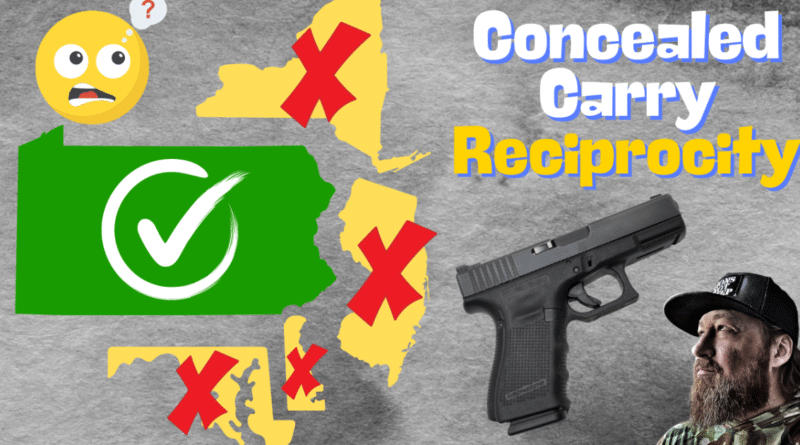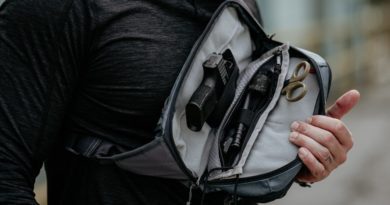Unconstitutional Concealed Carry Reciprocity & CCW Gun Laws
Concealed carry reciprocity is unconstitutional. There, I said it. I’m sure that triggered some of you reading this, and that’s fine. But there is nothing constitutional about concealed carry reciprocity and CCW gun laws — PERIOD.
The fact is, we’re losing freedoms here in America.
Trying to figure out reciprocity for carrying a concealed handgun from state to state can feel like trying to find your way through a labyrinth without a map. The fact that if I’m driving through multiple states, I need to understand their gun laws to keep myself out of prison is mind-boggling.
It’s actually quite ridiculous when it comes to laws related to concealed carry and what you may carry and where.
The laws vary wildly, and what’s okay in one place might not be in another. For example, did you know that in Florida, anyone over 21 who meets certain conditions or has a valid license from their home state can carry concealed? Don’t expect that to ever happen in states like California, New York, or New Jersey (anti-freedom states).
I understand how overwhelming it can feel, trying to make sense of these unconstitutional regulations so we can responsibly exercise our right to bear arms across state lines (after all, isn’t that what the 2nd Amendment provides us?).
That’s why I’ve taken the time to research and compile the “need-to-knows” for my fellow responsible gun owners because it seems laws are being passed based on feelings and emotions. Here is what I have to say about that.
This article is all about taking a deep dive into concealed carry reciprocity (such as this helpful concealed carry reciprocity map), examining its relationship with the Second Amendment, and exploring why some folks are pushing for uniformity across the board (me being one of them!).
So, let’s jump into this together — this data could very well change your approach to traveling with your firearm (while frustrating you at the same time).
And just a heads up, this article is going to use concealed carry license and concealed carry permit interchangeably, or even gun permit or valid CCW license, as they’re all the same thing with different terminology.
Table of contents
Key Takeaways
- Concealed carry reciprocity means if you have a gun permit from one state, other states with agreements might honor it, too. Each state has its own rules about who can “carry hidden guns” (concealed carry firearms) and how to get permission.
- The Second Amendment defends our right to bear arms, but each state can make its own laws on concealed carrying. A Supreme Court decision highlighted that the right to self-defense is crucial and must be respected across the country. Yet, it’s really not.
- There’s a big debate about having a nationwide law that lets people with concealed handgun licenses from one state carry their guns in any other state. This idea aims to make gun laws simpler and protect our 2nd Amendment rights everywhere.
- Some people worry that allowing guns to be carried across all states could lead to more violence (these are probably the same people who think more gun laws will prevent criminals from getting guns). They argue it’s important for individual states to keep their unique rules for safety and training.
- Understanding these gun laws is very important for anyone who owns a firearm or cares about self-defense rights. It helps us know where we can legally take our guns and how we can responsibly defend ourselves.

Understanding Concealed Carry Reciprocity
Concealed carry reciprocity allows individuals to carry concealed firearms across state lines, subject to varying laws and regulations.
In the U.S., different states have their laws regarding concealed carry, leading to complexities for gun owners when traveling. Even if you have a valid concealed handgun license in your state, you still can’t carry it everywhere (such as government buildings, schools, and court houses).
For instance, here in Pennsylvania, I can carry inside the state with my CCW license, but I can’t travel to states that border mine like NY, NJ, MD, DE, or DC with my firearm. If I wanted to carry my firearm legally in other states, I’d need to travel south or west.
But again, doesn’t it seem ridiculous that PA did all my background checks and has reported that I am safe to carry a concealed firearm, yet other states don’t think I am? I’d have to go through the same background checks there, so what’s the difference?
Definition, Variations in State Laws, and Current U.S. Status
I understand that carrying a concealed gun might sound complex with all the legal talk. Let me break it down for you. The idea behind concealed carry reciprocity is pretty straight to the point.
It means if I have a permit to carry a concealed weapon from one state, other states with an agreement will honor it, too. Think of it as driving across state lines with your driver’s license.
Now, here’s where things get tricky — each state sets its own rules around who can hide and carry their weapons and how they go about getting permission to do so. You’ve got states that are very strict, others not so much, and some don’t even require a permit at all! For instance, Colorado has this rule where they’ll respect another state’s hidden carry permit, but only if that state returns the favor to Colorado residents.
At present in the U.S., there’s no universal law on who gets to walk around secretly armed in public spaces to protect themselves or those around them; it varies widely across borders. Within some borders, some laws of the state even allow you to carry a handgun open carry (which I don’t think is a wise idea, but freedom says you can do so if you want).
Federal law steps back, letting each playground set its own swings and slides when it comes to hiding guns under clothing, jackets, or in purses.
So, before I plan any trips, I’m forced to check up on each state’s specific CCW laws — which it shouldn’t be that way as the right to bear arms is a RIGHT, not a privilege.
Think about it this way: driving a vehicle is a privilege, not a right. Firearms are the opposite, yet there are so much more restrictions and laws.
The Second Amendment vs. State Concealed Carry Laws

The Second Amendment protects the right to bear arms, but state laws can restrict concealed carry (can we say unconstitutional?).
Constitutional Rights and State Restrictions
I’ve always stood firm on my right to self-defense, and understanding the balance between constitutional rights and state restrictions has been key. The Supreme Court’s decision struck me hard.
It raised the bar for gun control, asserting that our right to carry a firearm outside our homes isn’t secondary. Justice Clarence Thomas made it clear that our self-defense rights are paramount. But where is nationwide concealed carry reciprocity?
Digging into concealed carry laws showed me how varied they can be across states. Some require a concealed handgun license; others have concealed carry reciprocity agreements that recognize permits from different states.
Then there is New York, with its law demanding more than just a desire for self-protection to carry a concealed weapon — something the Court found problematic. This ruling underscored something critical: any regulation must align with our nation’s historical stance on bearing arms.
The Argument for Nationwide Concealed Carry Reciprocity
The argument for nationwide concealed carry reciprocity is based on ensuring the right to bear arms is not unconstitutionally limited, with key legal perspectives and historical insights supporting this viewpoint.
The aim is to provide valid reciprocity agreements between states, allowing individuals with a concealed handgun license from one state to carry in another state, thus addressing variations in state laws.
1. Unconstitutional Limitations on the Right to Bear Arms and to Carry a Concealed Firearm
I read about a Supreme Court decision from a 6-3 vote that shook the table. It said people have the right to carry guns outside their homes. This ruling came after New York’s strict rules for getting a permit to carry concealed handguns in public were challenged.
Justice Clarence Thomas wrote that we can’t treat the constitutional right to bear arms for self-defense as if it were less important than other rights. This high bar set by the court means states and cities must think hard before adding new gun laws.
As someone who values my right to self-defense, this felt like a victory for what I consider an anti-freedom state. I’ve seen how confusing and restricting state laws can be when you’re just trying to carry a concealed firearm legally from one state into another where your permit isn’t acknowledged because of differing gun laws or lack of a reciprocity agreement with that state.
It often feels like figuring out a maze without an exit, and all you want to do is have the means to carry a firearm for self-defense. But it’s easy for me to get behind the wheel of my vehicle and drive across state lines where I could drive directly through crowds like we’ve seen people do all the time.
But do you know who we blame in those instances? The person, not the vehicle. Yet, in America, a shooting is always pinned on the firearm and not the person with their booger picker pulling the trigger.
Weird, right?

In sharing tips on carrying handguns across different states, I remind others always to check each state’s firearms training requirements and ensure they have valid permits issued by any state recognized through reciprocal agreements or risk violating local laws unknowingly.
Understanding these intricate details firsthand has made me appreciate even more the need for clear, consistent guidelines on our Second Amendment rights nationwide. And when I say guidelines, I mean blank papers because all gun laws are unconstitutional.
All that being said, it seems we’re fighting the wrong battles. Look at gun control vs opioids. They’re willing to spend all this time trying to take away gun rights, yet we have an opioid epidemic going on that no politician seems to care about unless it involves a firearm.
2. Key Legal Perspectives and Historical Insights to Carry a Concealed Weapon
Constitutional rights provide a foundation for understanding concealed carry reciprocity — protecting the right to possess and carry weapons in case of confrontation. Legal perspectives, bolstered by Supreme Court rulings, emphasize the importance of upholding this fundamental right across state lines.
Some people say that historical insights reveal that weak concealed carry standards have been linked to increased gun violence, prompting concerns about nationwide concealed carry reciprocity bypassing state laws and regulations on firearm safety and training.
But again, there is no historical data that shows we needed to do background checks, take classes, or do anything other than exchange money for goods and those goods being firearms and ammo. So, if we are making laws and regulations based on historical data, any of these gun laws we see today are unconstitutional and should be thrown out.
From a legal viewpoint, it’s essential to consider the potential implications of establishing nationwide concealed carry reciprocity — particularly when balancing Second Amendment rights against state restrictions. But those state restrictions shouldn’t even be put in place as the 2nd Amendment trumps any restrictions put on the people.
This includes assessing how federal mandates might impact law enforcement organizations’ ability to maintain safety and order, as well as addressing concerns about criminals carrying guns across state borders without regard for individual states’ regulations.
But here’s my thought on criminals carrying guns. What they are carrying is almost always a stolen firearm. So, having nationwide concealed carry reciprocity shouldn’t even take criminals into account. They will carry a firearm no matter what (which is why they’re criminals). But I also believe that everyone has the right to protect themselves, including those with felonies who have had their 2nd Amendment stripped away.
Get Your Concealed Carry Permit, Know the Gun Laws, and Get Firearms Training

Concealed carry reciprocity presents constitutional dilemmas due to varying state laws. We must safeguard Second Amendment rights while respecting state restrictions (until we get them all overturned for being unconstitutional).
Nationwide reciprocity needs careful consideration of legal and historical perspectives.
The complexity of gun laws demands informed action for responsible ownership and public safety. Understanding this issue is crucial for self-defense advocates, firearm enthusiasts, and policymakers alike.
But if politicians and government officials don’t want nationwide concealed carry reciprocity, I wonder why they feel it’s fine for their security to carry a firearm anywhere they go? It sure seems like there are two sets of rules here (but we already knew that, and the same can be said about the justice system).
For now, all you can do is obtain a CCW license so that you may carry a concealed handgun and follow firearms laws (or be a scofflaw, I’m cool with that, too).
If you want some great related reading, check out the articles we published below:
- How To Get a PA Concealed Carry Permit
- Concealed Carry Comfort: What Holster Sweat Guard to Get?
- Stylish And Safe: Creating The Perfect Concealed Carry Outfit
- Concealed Carry Comfort: How to Select the Best Gun Belt
- Is the Sig Sauer P365X the Best Concealed Carry Firearm?
- Concealed vs. Open Carry: Weighing Your Self-Defense Options
- Should I Carry a Spare Magazine with My Carry Pistol?
- Beyond Concealed with Deep Concealment Holsters For EDC
- Off-Body Carry: Safely & Easily Conceal with a Fanny Pack
- Is It Necessary for You To Carry a Firearm at Home?
As a side note to close out this article, if you want to support our website and are in need of any tactical gear (or any product for that matter), anything you purchase using our links below will provide us with a small commission. We don’t charge for our free content and our goal is to keep it that way. We don’t have a Patreon account to put things behind a paywall, nor do we sell pics of our feet on OnlyFans.
If you choose to use the links below and make a purchase (at no additional cost to you), we greatly appreciate your support as it helps us continue to publish free content (like this article) on our website:
- Optics Planet (use code SAS5 at checkout for 5% off)
- Amazon
We have also partnered with CCW Safe. It’s the concealed carry coverage that I personally have for myself and my family in the event we need to defend our lives. Feel free to use our CCW Safe link to sign up and get some coverage to protect yourself and your family.
Also if you have a product you would like us to check out and potentially review, please contact us and let’s discuss.
Concealed Carry Resources
- https://www.rand.org/research/gun-policy/analysis/concealed-carry.html
- https://www.usconcealedcarry.com/blog/what-is-concealed-carry-reciprocity/
- https://www.nbcnews.com/politics/supreme-court/supreme-court-says-second-amendment-guarantees-right-carry-guns-public-rcna17721
- https://www.nraila.org/get-the-facts/right-to-carry-and-concealed-carry/
- https://www.usconcealedcarry.com/resources/ccw_reciprocity_map/
- https://www.fdacs.gov/consumer-resources/concealed-weapon-license/concealed-weapon-license-reciprocity


*Disclosure: This article may contain affiliate links or ads, which means we earn a small commission at no extra cost to you if you make a purchase through these links. These commissions help support the operation and maintenance of our website, allowing us to continue producing free valuable content. Your support is genuinely appreciated, whether you choose to use our links or not. Thank you for being a part of our community and enjoying our content.
PLEASE CONSIDER SHARING THIS ON YOUR SOCIAL MEDIA TO HELP OTHERS LEARN MORE ABOUT THIS TOPIC.





